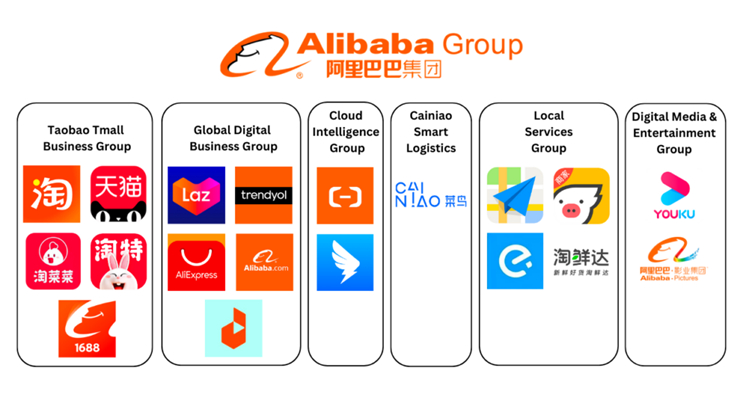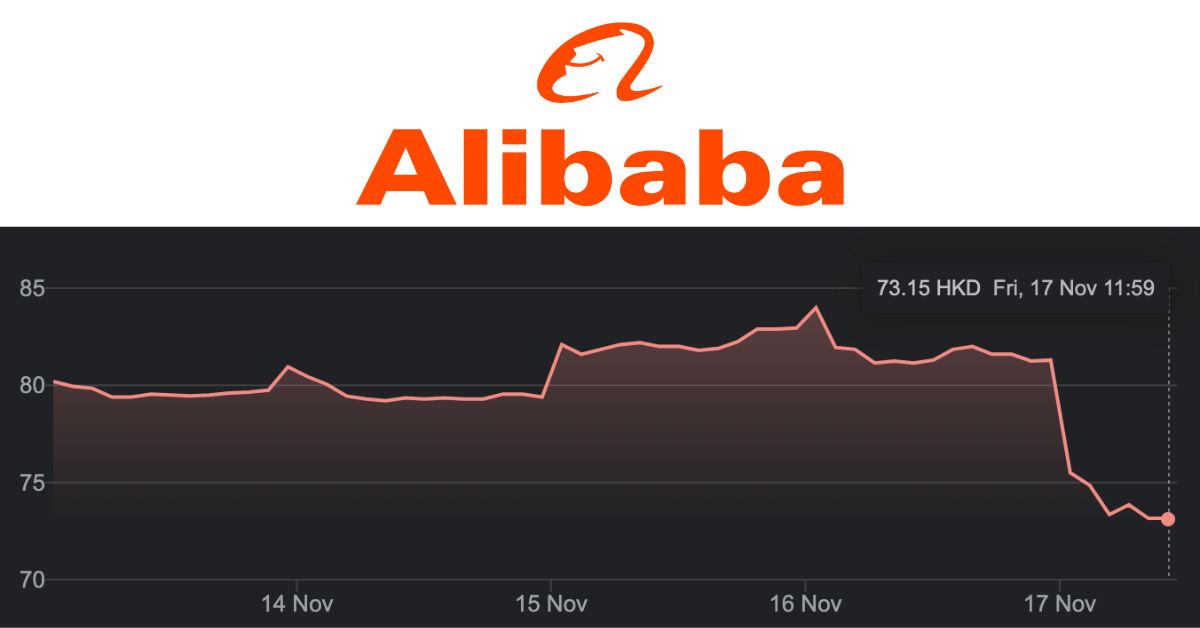Alibaba announced 3Q results along with a slew of negative news, providing updates to its reorgnisation plans. At the same time there was a separate announcement made that Jack Ma was looking to sell shares.
The only positive news which was in no way adequate to offset the negative news was that Alibaba announced its first ever dividend distribution of US$1 per US ADR share.
5 reasons why Alibaba fell 10%
Here we analyse the 5 negative reasons why Alibaba share price fell nearly 10%.

1) Lacklustre earnings
| P&L in RMB’m | Sep’23 | Sep’22 | Jun’23 | Mar’23 | Dec’22 | Variance (%) | Variance (%) |
| EPS in RMB’$ | Sep’23 vs Sep’22 | Sep’23 vs Jun’23 | |||||
| Revenue | 224,790 | 207,176 | 234,156 | 208,200 | 247,756 | 8.5% | -4.0% |
| Income from operations | 33,584 | 25,137 | 42,490 | 15,240 | 35,061 | 33.6% | -21.0% |
| Adjusted EBITDA | 49,237 | 43,311 | 52,052 | 32,123 | 59,162 | 13.7% | -5.4% |
| Adjusted EBITDA margin | 22% | 21% | 22% | 15% | 24% | 4.8% | 0.0% |
| Earnings per HK share (RMB) | 1.35 | -0.97 | 1.66 | 1.12 | 2.24 | N.M. | -18.7% |
| Non-GAAP earnings per HK share (RMB) | 1.95 | 1.61 | 2.17 | 1.34 | 2.41 | 21.1% | -10.1% |
Alibaba delivered revenue growth of 9% while income from operations increased 34% YoY. Adjusted EBITDA increased 14% while GAAP earnings per share (EPS) swung to a profit of RMB 1.35 per share. To give a better comparability, Non-GAAP EPS increased 21%.

Higher revenues YoY were recorded in all 6 segments. The two underperformers of the lot were the China commerce segment with a revenue growth of 4% YoY and the Cloud segment at 2%.
2) Cloud unit spin off cancelled
The recent expansion of U.S. restrictions on export of advanced computing chips has created uncertainties for the prospects of Alibaba’s Cloud segment.
Alibaba announced that a full spin-off of its Cloud business may not achieve the intended effect of shareholder value enhancement. Accordingly, Alibaba has decided to not proceed with a full spin-off, and instead will focus on developing a sustainable growth model under the fluid circumstances.

While adjusted EBITA grew 44%, the Cloud segment’s Sept’s revenue growth was weak at 2% YoY. With Alibaba being worried about the restrictions, there are concerns that revenue may decline as competitors gain an edge.
On the other hand, Tencent dismissed concerns that US export controls will constrain its AI development capabilities, at least for the foreseeable future, saying that it has stockpiled Nvidia’s H800 artificial intelligence accelerators, enough to develop its proprietary Hunyuan AI model for at least another couple of generations.
Kuaishou also disclosed that it has stockpiled 10,000 Nvidia A800 chips. 1 Nvidia A800 chip is at least US$12k and can supposedly sell for up to US$17k due to Chinese companies trying to stockpile before any further restrictions.
3) Grocery chain IPO paused
Freshippo (Hema)’s plan for an initial public offering has been put on hold on concerns of poor valuation as Alibaba evaluate market conditions and other factors that would contribute to a successful transaction to enhance shareholder value.
Alibaba shared that it could likely achieve a valuation of around $4 billion for Freshippo, which is lower than the $6 billion to $10 billion it was targeting when it considered raising a private funding round last year.
4) Jack Ma sells 10M shares
Jack Ma’s family trust is set to sell 10 million American Depository Shares of Alibaba Group Holdings worth about US$791 million at the US market closing. The sale will be done on 21 Nov 2023.
Taking another perspective, this could be viewed as a positive reason as Jack Ma continues to distance himself from Alibaba since he stepped down from his position as chairman in Sept 2019.
Investors who believe that Jack Ma is an individual that is targeted by various parties due to his criticism of certain regulators as well as his due to his large following arising from his charisma and influence.
5) Regulators queries Cainiao’s IPO
China’s securities watchdog has asked Cainiao, the logistics arm of Alibaba Group to submit additional information about its shareholders and operational structure as part of Cainiao’s IPO listing in Hong Kong.
The China Securities Regulatory Commission (CSRC) also asked Cainiao to describe its business dependency on Alibaba, related transactions, and duplication in customers and suppliers and provide details of spin-off plans by Alibaba’s other businesses.
Cainiao was also asked if it complies with China’s data security and personal data protection rules.
Chinese companies seeking offshore listings are required to submit materials to the CSRC ahead of their overseas share sales under a new filing system the country set up in March this year. It is a common practice for the regulator to seek supplementary information from listing hopefuls under this current system.
All in, it does not seem all that concerning at the onset as many of these questions are deemed as reasonable ones that the CSRC would ask. However, should Cainiao not be able to satisfactorily respond to the regulators, their IPO may not ever succeed in moving forward.
Alibaba continues to enhance shareholder value
Alibaba held cash of RMB624,501 million (US$85,595 million) as at Sept 2023, compared to RMB560,314 million as of March 2023.
The increase in its cash position was primarily due to free cash flow generated from operations which it used to repurchase ordinary shares and pare down its borrowings.
Alibaba announced that it would distribute US$1 per US ADR share.
As each US share is equals to 8 HK share, shareholders of Alibaba in HK will receive US$0.125 per share. The dividend amount is approximately US$2.5 billion in total.
The payment date is expected to be on 11 Jan 24 for holders of ordinary shares and 18 Jan 24 for holders of the US ADRs.
In addition, during the quarter ended September 2023, Alibaba repurchased approximately 18.6 million ADSs (the equivalent of 148.4 million ordinary shares) for approximately US$1.7 billion under its share repurchase program.
Alibaba has a remaining mandate to buy back up to US$14.6 billion under the current share buyback program which is effective through March 2025.
Perspectives in closing

Alibaba restructured into the following 6 groups as shown above and appointed 6 CEOs, 1 for each group. This approach was to allow each CEO more freedom in decision making and growth. It also meant that each group could no longer rely on Alibaba for resources and must seek funding and growth independently.
The Taobao Tmall Business Group has been the main revenue driver and cash cow, contributing more than 1/3 of the group’s total revenue and all its EBITA and would be able to continue independently.
The global digital business group which includes Lazada has historically been dependent on Alibaba to compete in markets such as in South East Asia against Shopee and this is likely to continue in the near future.
Now with Cloud and Freshippo’s fundraising activities in limbo while Cainiao’s IPO is going through regulatory queries, there is no major external fundraising activity with a high certainty at this stage for Alibaba.
Alibaba really needs Ant IPO
Alibaba really needs Ant to shine now. Ant Financial seems to be moving in the right direction operationally as China opens Alipay to foreign credit cards.
Alipay is also expanding its network of international e-wallets, linking up with e-wallets from 7 countries and regions such as Hong Kong, Macau, Malaysia, Mongolia, Singapore, South Korea, and Thailand.
Nothing would remove the overhang more than an Ant IPO reboot as this was what brought Alibaba down in the very beginning.

